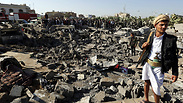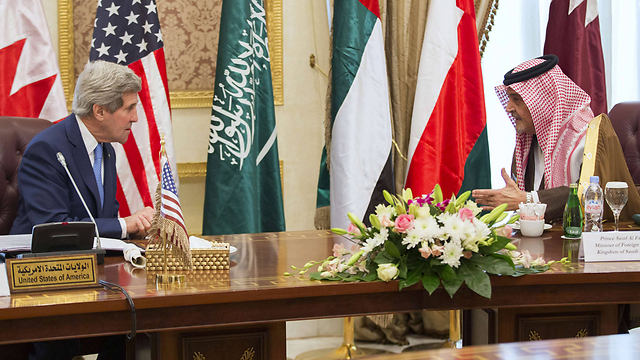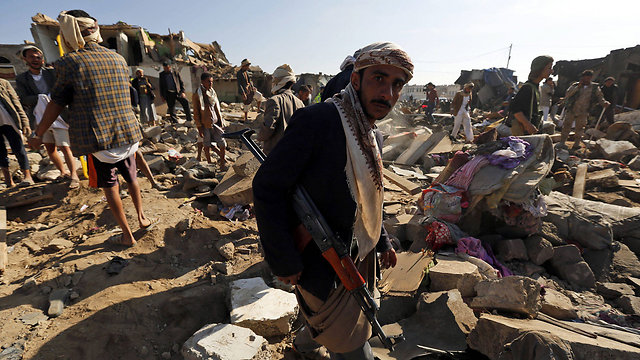The Americans also understand the strategic significance of the capture of the Bab-el-Mandeb strait by a Shiite tribe loyal to Iran, which now controls the entrance to the Red Sea from the Indian Ocean. But the US National Security Council and President Barack Obama were so hell-bent on the need to fight al-Qaeda's branch in Yemen that they failed to see the much greater threat being created right under their noses.
Fortunately for Obama, the Pentagon had already ordered an evacuation of American military intelligence personnel and Special Forces operating against al-Qaeda out of an airbase in Yemen. The order came a week ago and on Tuesday, the Houthi captured the base. The American military and its intelligence community were already far away, and an even bigger fiasco was avoided.
The question remains as to what caused the American blindness, and whether there were any preventive steps they could have taken. The reason why is fairly clear: The lack of US vision stemmed mainly from its incorrect assessment of the Houthis' strength, but they also did not want to upset the Iranians at a critical stage in the formulation of an agreement on the Islamic Republic's nuclear program.
Even now, after the Saudis have already swung into action, the Americans prefer to "lead from behind," like they did in Libya, while maintaining an even lower profile. They're only providing the Saudi with intelligence on targets inside Yemen and on the progress of Houthi forces towards the capital of southern Yemen, Aden, and towards the Strait of Bab-el-Mandeb.
The Americans, who have dozens of drones operating in the area, have excellent intelligence on what's going on there at any given moment, and they pass this information to the Saudi air force, with its F-15 and F-16 warplanes, as well as to the air forces of other Gulf states and Jordan and Egypt, who are also taking part in the operation. But unlike in Libya, the Americans are not providing actual assistance. Again, so they won't upset the Iranians.
But the American failure in Yemen is not the main story here. The Houthi takeover of southern Yemen and the threat to the Bab-el-Mandeb strait is the main danger, because it allows Iran to block the main international shipping lanes through the Suez Canal and the Red Sea to Asia and East Africa, at any given moment.
Global threat
The threat of blocking major shipping lanes is actually a global threat that also affects Europe, but primarily the countries for which the Suez Canal and the Red Sea are the main commercial shipping lanes. Israel is at the top of this list, while Iran could also easily threaten Egypt, Sudan, Jordan, Saudi Arabia and Ethiopia.
The Americans can no longer quickly dispatch their aircraft carriers from the Mediterranean Sea to the Persian Gulf in time of need, or to offer military support in case of war in the Persian Gulf, because they will have to take into account the fact the Iranians could block their passage through their base in Bab-el-Mandeb.
This is also the reason Iran coordinated efforts to support the Houthi in Yemen, taking advantage of the chaos in the country to insert its proxies. Iran has maneuvered in Yemen using the exact same policy it adopted in Lebanon, Syria and Iraq. It is not using its own forces, but rather finds a "messenger" to do its bidding.
Iran recognized the opportunities in Yemen, where all-out war is raging. It's not the Houthis who are taking over Yemen, in the same way the Islamic State is taking over Iraq. The Houthis' success is largely owed to the help they receive from Yemen's ousted ruler and his people, who maintain control a large part of Yemeni security forces, its intelligence organizations and especially the Yemeni air force.
It's not for nothing that the Houthis managed to take over the central airbase in al-Anad so quickly. The plane that bombed the residence of the incumbent president, who took refuge in Aden, left from that very airbase. The Houthis, who have 7,000-10,000 fighters, are not the only ones who work for Iran. There are also Sunni tribes, armed Sunni militias, and units of the Yemeni army still loyal to the ousted president Ali Abdullah Saleh who work for the Iranians and receive support from Tehran.
Once again Iran took advantage of the chaos created by the upheaval in the Arab world to achieve its own goals. But this time, Saudi Arabia, realizing salvation would not come from the US, went to war. It's understandable. The Houthi takeover of Yemen leaves Saudi Arabia surrounded from all directions by forces loyal to Iran. If Iran wants to, it could not only paralyze the cities in the western part of Saudi Arabia and cause trouble in the entire kingdom, but also stop movement of pilgrims to Mecca via the Red Sea and the Indian Ocean.
As soon as Iran and its allies gain control the Strait of Bab-el-Mandeb, on top of controlling the Strait of Hormuz, they can cut off the oil and gas supply to almost the entire world. This is a global threat and a direct threat to Saudi Arabia. This is why the newly crowned king Salman put himself at the head of a Muslim coalition spanning from Pakistan to Egypt, which is fighting on the ground and in the air in an attempt to stop the Houthi takeover of southern Yemen.
Emulating successful fight against IS
This coalition has some 150 fighter jets and 150,000 Saudi ground troops. This is a significant force. Talks of this force and the need to stop the Houthis in Yemen have been ongoing for several months but it was only when the Houthis, aided by Iran, started advancing on the Strait of Bab-el-Mandeb, that the Saudis realized that if they don't act now, it would be too late. At the moment, they're mostly bombing the bases of the Yemeni air force, which is aiding the Houthis, and hitting fighter concentrations, exactly like the Americans are doing successfully against the Islamic State.
The Saudis know that air raids would not be enough even if they do receive intelligence on targets from the Americans and other players in the region. That is why they put together this massive ground force, which they probably intend to use. They understand that only a large force could defeat the Houthis.
But the Houthis are not the only enemy the Saudis and Americans face in Yemen. The strongest al-Qaeda branch in the Arabian Peninsula is in Yemen. Al-Qaeda's Yemeni branch stands most to gain from the Houthi revolt, but there are rumors the Iranians are aiding al-Qaeda as well in order to undermine the stability in Yemen. In any case, the Saudis stand to gain from reinstating former president Abd Rabbuh Mansur Hadi's regime. The success or failure of such an endeavor are crucial to Saudi Arabia and the Sunni coalition that joined it, all united against the radical Shiite axis led by Iran.
The Israeli interest is clear. Iran's smuggling routes to Gaza go through Bab-el-Mandeb and through Yemen. Yemen served as a secondary base for the Iranians on their way to Sudan when they were trying to smuggle weapons through Sudan to Egypt and from there through the tunnels to Gaza. This base is now growing stronger, even though Sudan is no longer Iran's ally. And this is an important development.
Sudan joined the Saudi-led coalition following a diplomatic dispute with Iran in the past six months, so the threat to Israel and Egypt is now less serious than it was before, despite of the takeover of Bab-el-Mandeb. But the threat to Israel's shipping lanes if the Houthi take over the Yemeni side of the Bab-el-Mandeb strait is a serious and significant one, especially economically.
While an all-out war is raging in Yemen, Saudi Arabia's military campaign is good news for Israel, and all that is left is to wish them luck, because the Americans can no longer be relied upon.
However, the fighting is bad news for the dozens of Jews still left in the town of Raida, some 70 kilometers west of the capital Sana'a. Some are also believed to remain in southern Yemen and their fate remains unknown at the moment.
I have visited Yemen several years ago and even then the Houthi posed a risk to Jews, but the regime protected the Jewish community and extracted them from areas taken over by the Houthi. Abdullah Saleh, who fought the Houthi at the time, is now aiding them and is largely responsible for their achievements.




















